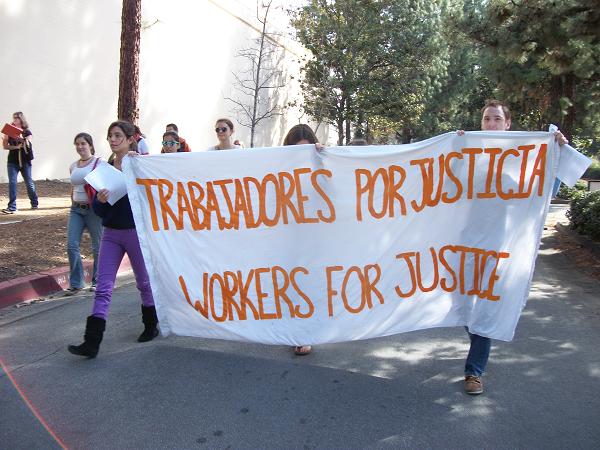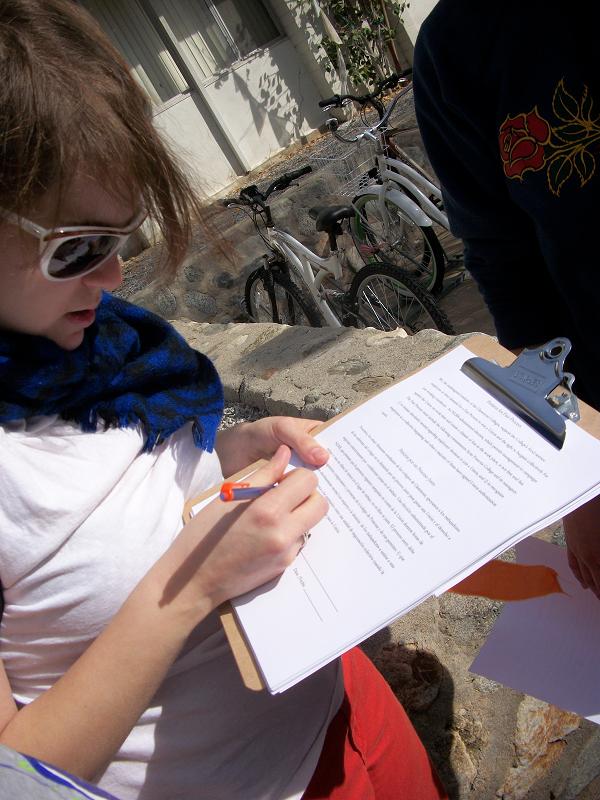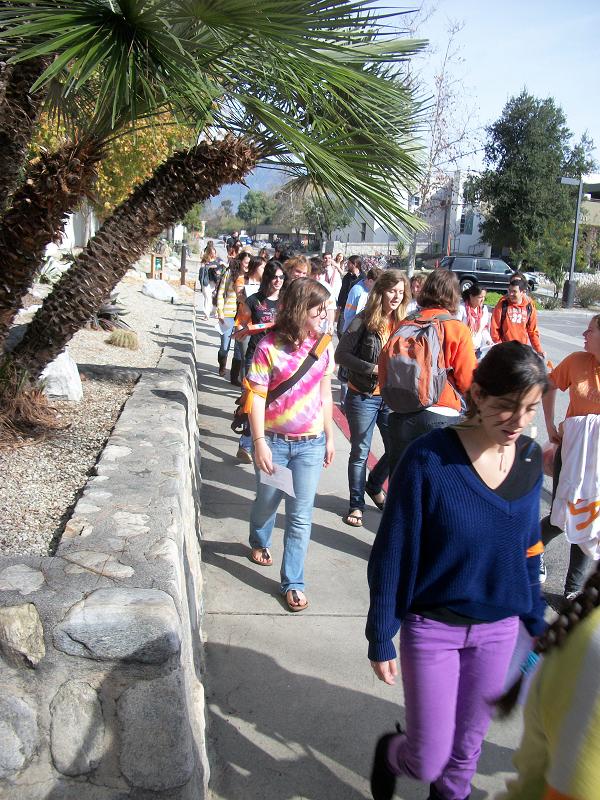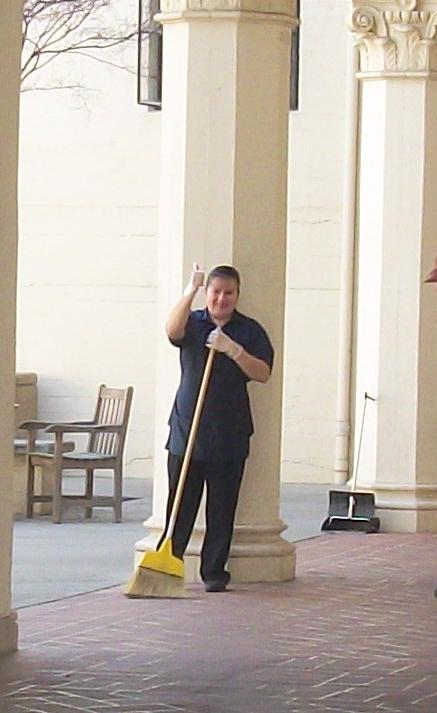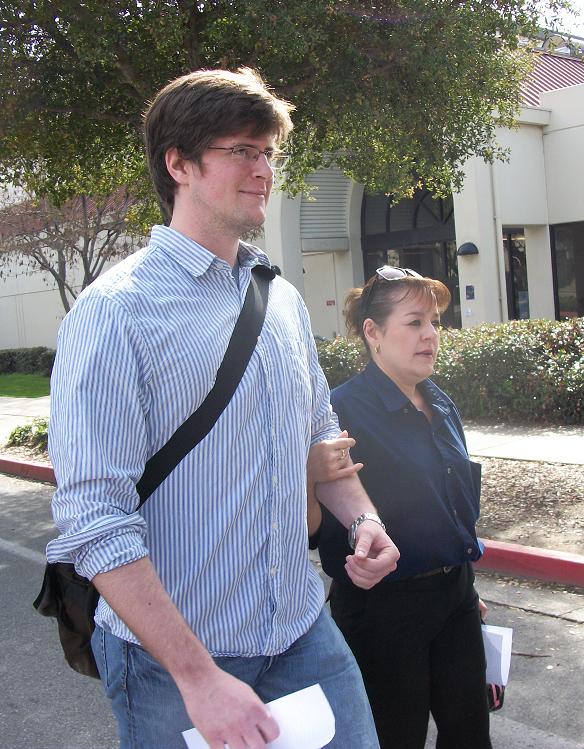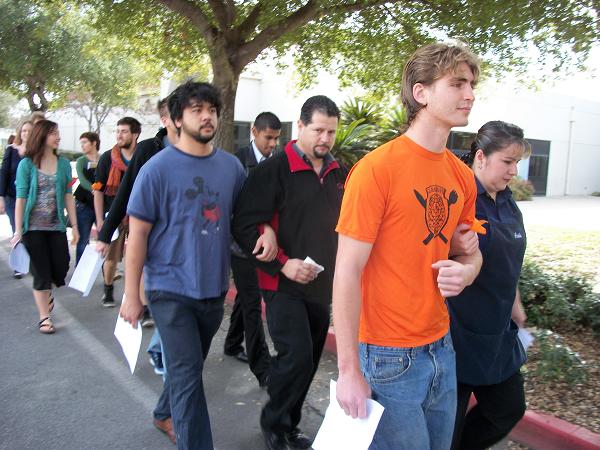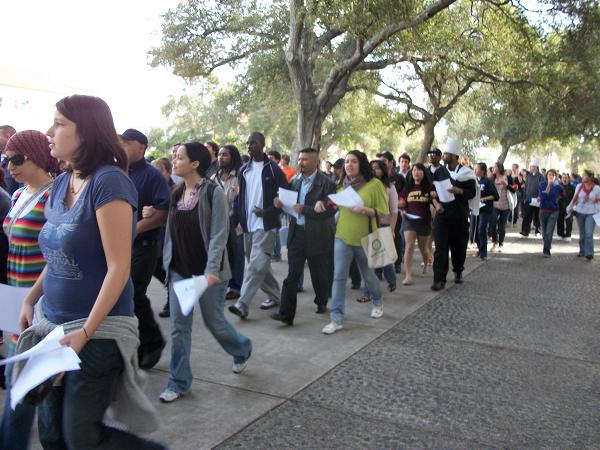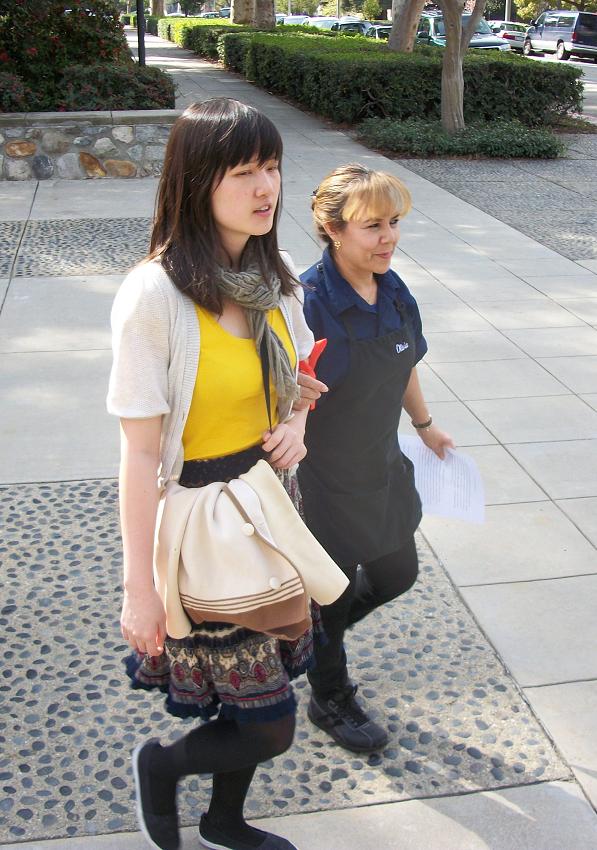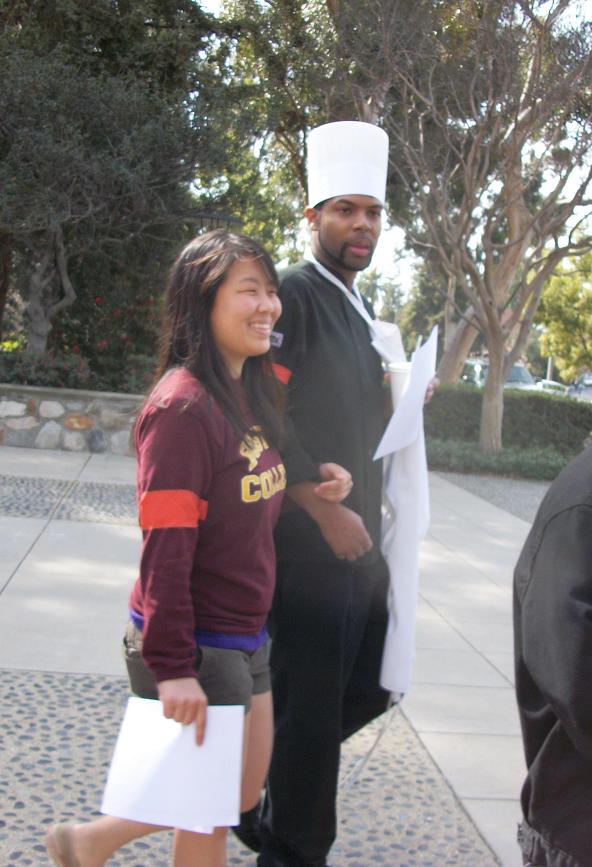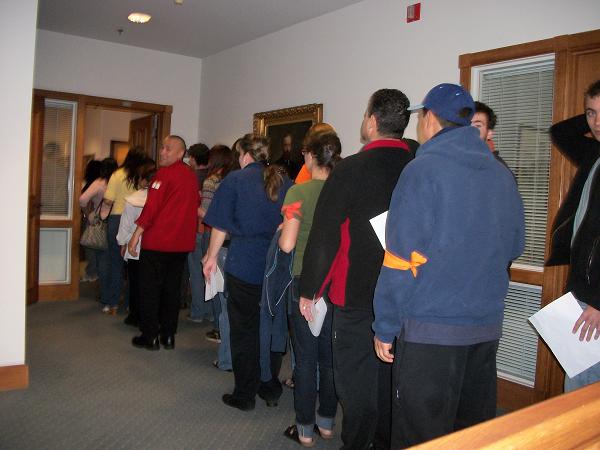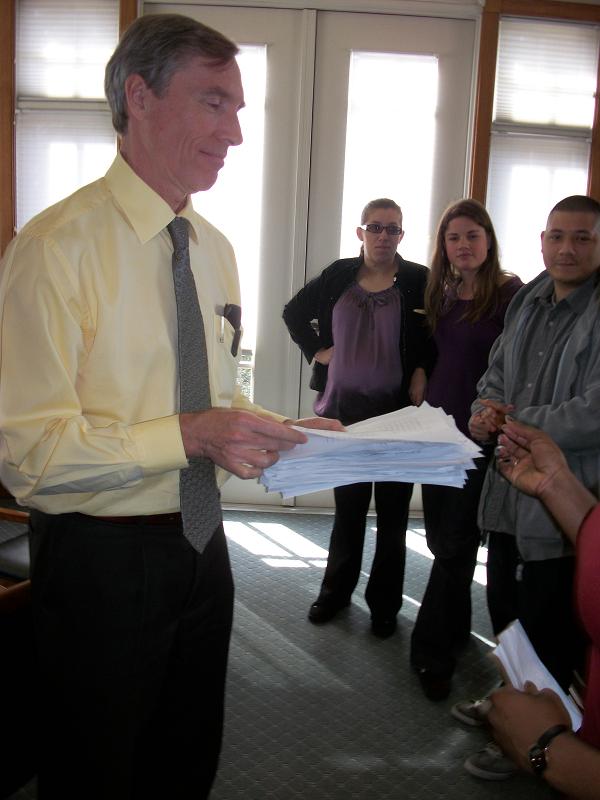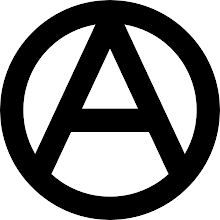Thursday April 15th, 2010
We here at Claremont Solidarity have many revolutionary duties besides writing blog posts – organize, escalate, write senior theses – and these have lately taken precedence over reporting on the continuing struggle of the Pomona College dining hall workers. In brief then, here is what has happened over the past week or so:
On April 6th, worker organizer Maria ‘YoYo’ Garcia debated Karen Sisson, Pomona vice president and treasurer, in a panel forum along with three faculty. The Rose Hills Theater at Pomona College was packed with supportive students wearing orange armbands and buttons, while a crowd of workers held signs in the audience. The debate was an embarrassment for the administration, which was clearly not expecting or ready to be so directly challenged by the workers themselves so publicly. The full two-hour long video can be seen here. A highlight is YoYo telling Karen Sisson that all of the benefits the workers have gotten as workers where won through their own struggle, and not the good will of the administration.
A couple days after the public debate, workers walked off the job in the dining halls in a coordinated break-time action. Dining hall workers took their half hour breaks at the same time and marched out of the dining halls together, leading a short worker-only march through the campus.
Shortly after the walkout, workers took over an anti-union meeting, refusing to be intimidated and speaking out against the attempts of the managers to make them listen to anti-union propaganda.
The coalition of students and workers has begun expanding to include the Ohlone tribe, a local indigenous group that is also fighting for recognition. The Ohlone youth have exhibited a militancy that far exceeds the student members of Claremont Solidarity. Workers and student organizers are to be guests of honor at the upcoming Ohlone pow wow.
Today, April 15, workers again staged a breaktime walkout, this time leading a march of about 150 students to the Pomona College administration building. The march was led by a large banner painted by Ohlone youth. During the march, a representative from a filming crew that was using the elite environs of the college quad to shoot a commercial addressed the marchers with the request that they keep it quiet so that the commercial could be filmed. Students and workers responded with noise.
Claremont Solidarity updates will continue to be unreliable until thesis dates and final exams are past, or until the revolution is won.
Saturday's action, timed to coincide with a meeting of the Pomona College trustees, allowed workers to share their testimonies and featured the participation of religious leaders, musicians, and the grandson of the late labor leader César Chávez, Anthony Chávez.
As the crowd of mostly students assembled outside Bridges Auditorium, they chanted their demands for justice. Mariachi Serrano de Claremont sang "Tristes recuerdos."
A student organizer began with a summary of the situation. "The workers on Monday went to President Oxtoby's office and asked for a non-intimidation agreement, and he did not agree to that. I don't care what words he used, but he did not agree to that.1 So we're here today to show our support and hear from workers, what they think, what they feel. It's the first time that they've had this opportunity, so we're here to show our support for that."
She then introduced Father Patricio Guillén, a longtime social justice advocate in the Inland Empire. "Good afternoon. ¡Sí se puede! ¡Sí se puede! ¡Que viva César Chávez! ¡Que vivan los trabajadores! I was invited to come and share with you, and I think that it's a beautiful occasion, because sometimes crises are looked at as curses, but we are in a crisis in this nation because we have followed the path of power and arrogance rather than humility and service. And we have forgotten that we are one human race bound together and our destiny is to work together to find solutions to the problems that we run into as we journey towards eternity. We just lost a beautiful person, Howard Zinn, he wrote the [People's] History of the United States, and he wrote the good and the bad about it, not to downgrade, but also to remind us that we are on a journey and we have some difficult moments like right now. Here, the workers in Claremont College, Pomona College. As a democracy, we don't have an economic system that's democratic. Eighty percent of the goods in our nation, in the economy is in that hands of about 25%, and 95% of the people posess only 20%, that's not democracy. It's not democracy either to see the political power be concentrated upon the corporations that forget the human person and the dignity of each one of us.
"We also know that we have lost the battle, to some degree, on education and the ideology of imperialism. The means of communication have also been taken over by the powerful. We, as citizens of this coutry have taken for granted our freedom and now, we have to struggle and fight and take those liberties and justice for everyone. Today we're present to say we're in solidarity with the workers of this community because we know that the workers are the ones that do the hardest part of the labor, and they get the least. I think that's an injustice. A living wage should be a dignified wage, a wage for people to live a decent human life! That's why I'm here, and that's why you're here, and I'm proud of you as young people that you're taking seriously your role in the world today. We can co longer afford to have students in our universities that are ivory towers, isolated from the real and the important struggle for like and for liberty.
"That ugly reality that we have is focused on the corporations, which have forgotten, just as the Supreme Court said that they are persons, therefore they can give money to the candidates that run for office. Well if they are, then why don't they pay taxes like everybody else?
"We know that at one time we could say that we were a government for the people, of the people, and by the people, but yet, we have seen it go in the opposite direction: A government by the corporations, for the corporations, and by the corporations. That's because we fell asleep. And we listened to the, as it were, isolated and distorted presentations of 'We don't want large government.' But we want pricate, large corporations? What a contradiction! Today we need to realize to take upon our own the torch of freedom. Our founding fathers said that all men and women are created equal, and they are entitled to their inalienable rights to life, liberty, and the pursuit of happiness. It's not true for the workers! That's why we're here. We don't just want one sector of our country to live a high and good life. We want everybody to have a dignified life. We want to live in a world where we don't have to go to war to prove that we are a great nation. We want justice and we want to struggle for it--and democracy--so we can say to the world that we are a people that love and want and respect democracy and justice for all."
Next, Edith, a worker, spoke."Estoy aquí por justicia, y gracias a todos por estar aquí. Mi nombre es Edith [...], yo sólo tengo dos años de trabajar aquí en el colegio y trabajo en el área del salad bar, y me contenta, lo hago con mucho gusto para ustedes.
"Me gusta porque tengo experiencia, como diez años trabajé en el distrito escolar de Ontario, y esto me sirvió de experiencia, y creo que esto me ayuda a desempeñar mejor mi labor.
"Y aquí he notado unas inconveniencias, algunas que existen, injusticias para los compañeros. Como los que han sufrido algunos accidentes. Y los tratos que a ellos se les dan, muchas veces no son justos, y eso para mí se llama injusticia. El miedo que yo tengo es que si algún día, Dios no lo quiera, me pueda suceder algo. Y entonces, ¿qué va a pasar conmigo? Bueno, si ellos están pasando por eso, quizás algo me ha de pasar a mí, y entonces, ¿quién me va a apoyar?"
[I'm here for justice, and thanks to all for being here. My name is Edith [...], I've only been working here at the college for two years, and I work in the salad bar area, and it makes me happy. I'm glad to do it for you. I like it because I have experience, I worked for the Ontario school district for about ten years, and I think it helps me better undertake my work. And I've noticed a few problems here, a few injustices that have happened to some co-workers. Like those who have been in accidents. And the treatment that they receive, are often unfair, and to me, that's injustice. The fear I have is that some day, God forbid, something might happen to me. Then what will become of me? Well, if they are going through this, something could happen to me, and then, who would be there for me?]
The next speaker was Elisea. "Buenas tardes a todos los estudiantes y presentes señores, quizás algunos profesores están aquí en este momento. Trabajadores de Pomona College que nos van a escuchar y tal vez nos pueden ayudar un poquito en esta marcha, en esta lucha que estamos empezando ahorita. Mi nombre es Elisea [...], mi profesión es cashier, clean-up, y set-up. Tengo tres cosas que hacer en el dining hall. Gracias por el apoyo que todos los estudiantes nos han dado, no desde ahorita sino desde siempre. Han pasado años, tengo quince años trabajando ya en el colegio con los estudiantes y siempre nos han ayudado en algunas luchas que hemos tenido, en algunos problemas, y han sido siempre con nosotros aunque tal vez no lo merezcamos pero ellos dejan de hacer sus tareas por estar con nosotros. Pero ellos dicen, 'No le hace. Estaremos con ustedes siempre en la lucha.'"
[Good afternoon to all the students, and maybe there are some professors here with us? You'll hear us Pomona College workers and maybe you can help us a little in this march, in this struggle we're now beginning. My name is Elisea [...], my profession is cashier, clean-up and set-up. I have three jobs in the dining hall. Theanks for the support all the students have given us, not just now, but always. Years have passed, I've been working at the college with the students for fifteen years, and they've always stood with us in some of the struggles we've had, on some problems, and they've always been with us even though we might not deserve it, but they leave their homework aside to be with us. But they say, 'It doesn't matter. We'll always be with you in the fight.'"]
Francisco then gave his testimony. "Mi nombre es Francisco. Yo tengo trabajando para Pomona dieciséis años. A mí lo que me gustaría de todo esto es que se pudiera contratar a más empleados para evitar accidentes. Porque así podemos luchar mejor como podemos trabajar. Porque yo, hace como cinco años tuve un accidente porque tuve que hacer 40 pizzas en una hora. Y con tanta presión... Y yo diría que así como, estando unido todos nosotros como empleados, podemos mejorar todo y tener más poder nosotros contra los empleadores, porque así podemos luchar contra ellos."
[My name is Francisco. I've been working for Pomona for sixteen years. What I'd like to see come out of this is the hiring of more workers to avoid accidents. Because that way, we can improve the ways we're able to work. Because about five years ago, I had an accident because I had to make forty pizzas in an hour. And with so much pressure... I'd say that, us all being together as employees, we can improve everything and have more power for ourselves against the employers, because that way we can fight back against them.]
Don spoke next. "Hello everybody. First of all, I wanna thank all you guys for coming out, supporting us. I've known some of you since you were freshmen, and you're seniors now. And we get, you know, attached to you just like teachers do. So some of you, I feel like you're kinda like my children. So I thank you guys so much for supporting us, most of what--matter of fact, all of what my co-workers say, it's actually all true. And any time anyone has any question and wanna come talk to me, you're welcome to come speak to me freely. Just walk up to me and let me know. I just wanna say also, I came to Pomona because I thought it would be a pleasant work environment. You know, I'm a student myself. I'm back in school. Working at a school actually helps me out. That's why I have a special relationship with most of the students here. And I'm just for fairness. Everything you guys protest, we protested the same thing when we were in college. And it's kinda sad to say that many years later we have to still do this, but this has to be done. We definitely need a union."
Juan then took the stage. "Hola, buenas tardes. Mi nombre es Juan. Soy trabajador de Pomona. Tengo nueve años trabajando. Trabajo de dishwasher. Y quiero darle la gracias a todos por el apoyo que nos están brindando. Nosotros, nos reunimos para tratar de tener el apoyo de todos ustedes y lograr algo, y queremos un poco más de respecto para todos y un mejor salario. Y de mi parte, antes que todo, gracias por el apoyo todos ustedes."
[Hello, good afternoon. My name is Juan. I'm a Pomona worker. I've been working for nine years. I'm a dishwasher. I want to thank you all for the support you've been showing us. We got together to try to get your support and achieve something, and we want a little more respect for everyone and a better wage. For my part, first of all, I want to thak you for your support.]
Benny spoke last. "Gracias por apoyarnos hoy y siempre. Y en verdad, necesitamos todo ese apoyo, porque hay muchas cosas que queremos mejorar en las cocinas de Pomona. Necesitamos que nos den más respecto, y que nos tomen un poco más en cuenta, porque parece que nosotros, el departamento de food service, somos los más abandonados. Ustedes siempre miran unas flores muy bonitas en los jardines de Pomona. Siempre pueden mirar edificios muy bonitos, pero no muchos de ustedes saben lo que realmente pasa en las cocinas y es lo que nosotros, es lo que estamos tratando de hacerles saber en este día, todas las injusticias que estamos pasando. En el pasado ha habido personas, compañeros de trabajo que se han lastimado, y por las pólizas que tiene el colegio, esas personas, después de un año, ya no han sido aceptadas para seguir trabajando. Esas personas han perdido su casa. Se sienten con mucha depresión y yo creo que es necesario cambiar un poco las pólizas. Y creo que todos juntos podemos hacer algo para mejorar todo el ambiente que tenemos aquí en Pomona College."
[Thanks for supporting us today and always. And truly, we need all this support, because there are many things we want to improve in Pomona's kitchens. We need to be accorded more respect, and to be considered, because it seems that we, the food service department, are the most neglected. You always see pretty flowers in Pomona's gardens. You can always see beautiful buildings, but not many of you really know what happens in the kitchens, and that's what we are trying to show you today, all the injustices that we've been experiencing. In the past there have been people, co-workers, who have been hurt, and by the policies that the college has, those people, after one year, are no longer accepted as workers for the following year. Those people have lost homes. They become very depressed and I believe that those policies need to change a bit. I think that together, we can all do something to improve the environment we have here at Pomona College.]
The students and workers then marched to the Smith Campus Center, where they heard from a few more workers, Professor José Calderón, who read a statement of solidarity from Dolores Huerta. Twenty five other colleges also sent letters of support, the professor reported. He also encouraged the students to challenge their professors to become involved in the social change they so often write about, and discussed the card check process. He then informed the crowd that the local Minuteman had taken a position against the creation of a national holiday for César Chávez, saying that "what he did does not merit a holiday,"2 and argued that Chávez does deserve a national holiday for his legacy of non-violence and unity.
Anthony Chávez spoke last, and he began by thanking the professors and students for their involvement in the struggle. "I've been asked to come and speak because I'm César Chávez's grandson, and I'm always very proud of my tata and all of his great work, but before I was even born, my grandfather was out working on behalf of other college staff and faculty when they were organizing. So today, I stand with you as a former college student who's here to see justice for those who feed all the students on the campuses. You guys are all here because you recognize the misnomer promoted by college administrators that say that the dining room workers can only decide the issue through secret ballot elections, and these administrators claim that this is the only way to have a democratic alternative.
"These administrators know this nation's labor laws are broken, they know that when workers vote to be in the union, it's done like any other election in America. They know that all political parties are granted the opportunity to share their opinion, but when employers use a secret ballot election, it's management-rigged balloting. Employers hold all the power, they control all the information the workers get, and they routinely poison the process through intimidation, coercion, and firing. The food workers' struggle here is not new for me, because I grew up among many other types of food workers. The farmworkers, too, have often seen the growers use the secret ballot election as another tool of oppression. At Giumarra Vineyards, the world's largest grape corporation, where I was brought up in Kern, California, workers faced cruel working conditions, and mistreatment, and even two died from extreme heat, to bring us all the fruits and vegetables we enjoy. So 75% of the workers at Giumarra signed a petition saying they wanted to be represented by the United Farm Workers, and a week later, after a secret ballot election, they lost by 49%. California state later threw out this election because of its illegal threats and coercion against the employees. And that's why the farmworkers have convinced the state legislature to pass a bill in each of the last three years, letting the workers choose a process other than secret ballot elections only to have that measure vetoed each time by Governor Schwarzeneggar. And it's why the labor movement is trying to pass a similar bill, the Employee Free Choice Act, in congress, with the support of President Obama. Our workers should be able to vote by signing their name in the privacy of their home or someplace else away from employee bullying. After all, the law allowed homeowners that they couldn't afford with a simple signature. The law allowed banks to loan out money to people who couldn't afford to borrow with a simple signature. The law allow lenders to package these loans and sell them, crippling our economy, with a simple signature. And with a simple signature, all of you can join a gym, and with a simple signature, any one of us can join the armed services. But when American workers seek their fair share in the economic wealth that they themselves produce here at home, they can't sign their names to join a union. What's really at stake here on Pomona College and across this nation is simple self-determination. Courageous workers on this campus are taking a stand, demanding the freedom of a union. Therefore, those of you, as students, have some important questions to ask yourselves. Are you only responsible to your parents and yourselves for being successful in your studies? Or do you owe a broader responsibility to support the dining hall workers who are struggling for a better life against shameful abuse defined on the job site. Is it enough to just sit in class and just study the social ills of society? [...] You have a responsibility to go out there and take part, and be part of the solution. Pomona College cafeteria workers' authentic non-violent aspirations for self-determination cannot be fulfilled in one of the most liberal and wealthy campuses in America, where else is it gonna happen? Who else is gonna do something if not you? The college workers are heroically doing something to redress years of grievances, then what does it say about students on this campus if they remain indifferent, or neutral? How do you stay apathetic in the face of immoral treatment of workers whose only sin is seeking a better life for themselves? Especially when you see the workers the most, and when your tuition pays their salaries? Some words my grandfather shared with students may help us here in this time. He said, 'We cannot seek achievement for ourselves and forget about progress and prosperity for our community. Our ambitions must be broad enough to include the aspirations and needs of others, for their sakes, and for our own.'"
Spang, a Pomona student, then voiced his support for the workers, and Professor Calderón closed the rally by leading a rendition of the farmworker anthem "De Colores."
_____________________________________________
1. Oxtoby, David. "Text of President Oxtoby’s E-mail." Workers for Justice, March 7, 2010. http://workersforjustice.org/2010/03/text-of-president-oxtobys-e-mail/. Accessed March 11, 2010.
2. Wall, Stephen. "Speaker blasts observance of Chavez holiday." San Bernardino Sun, March 2, 2010. http://www.sbsun.com/news/ci_14499296. Accessed March 11, 2010.






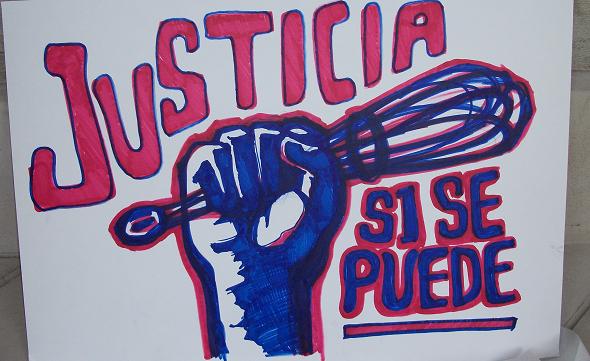
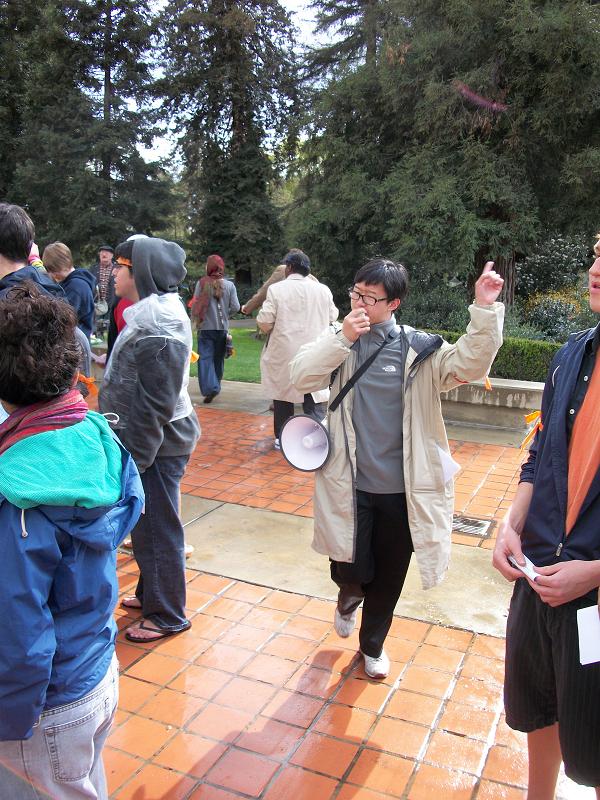
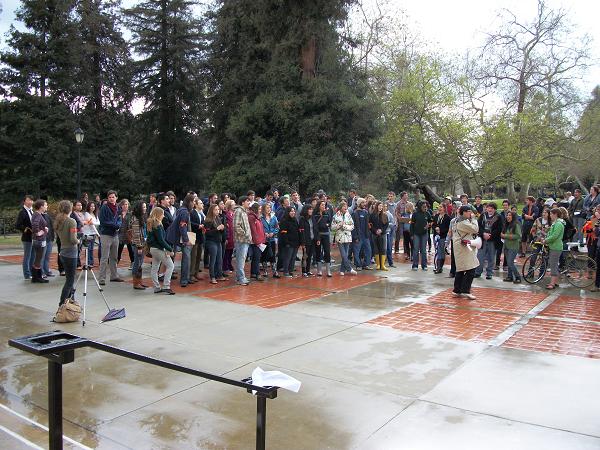

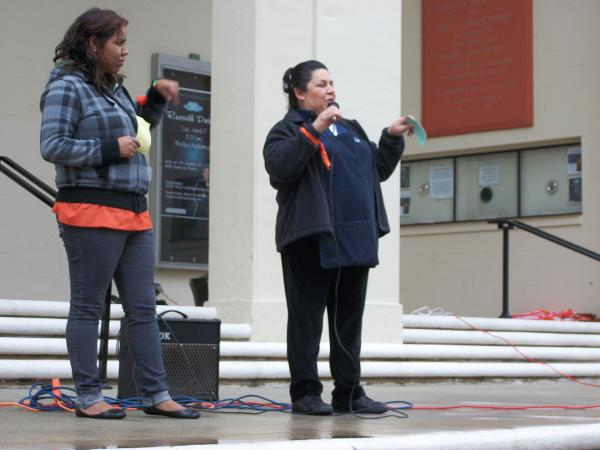
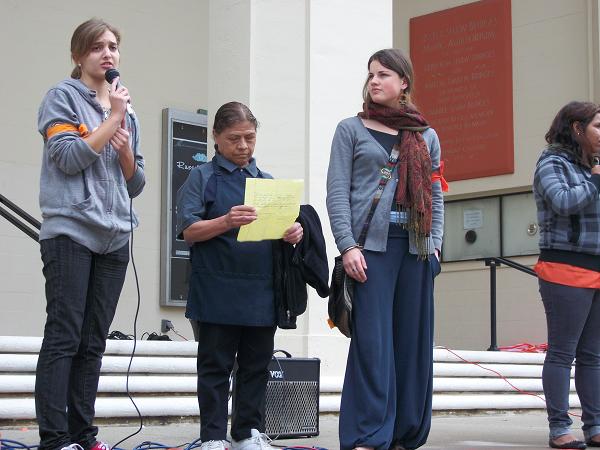
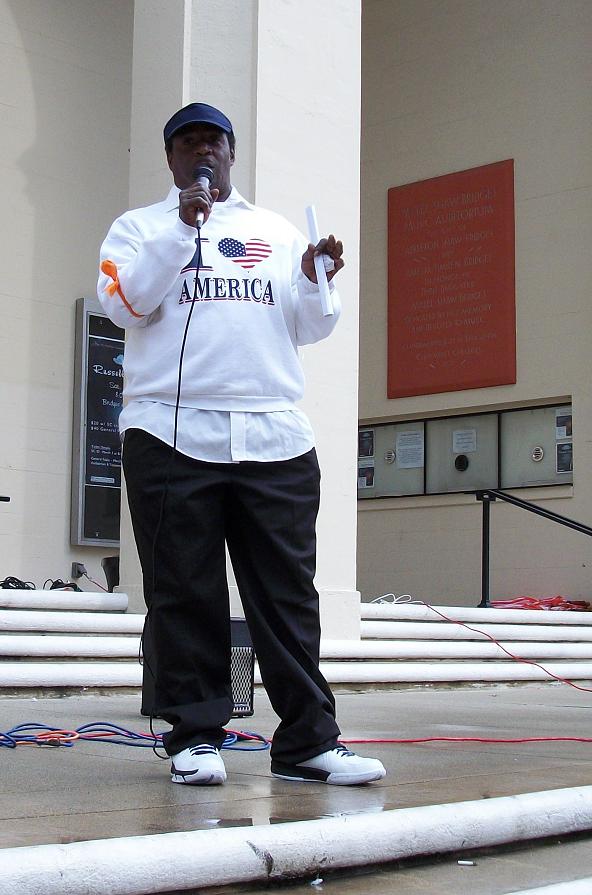
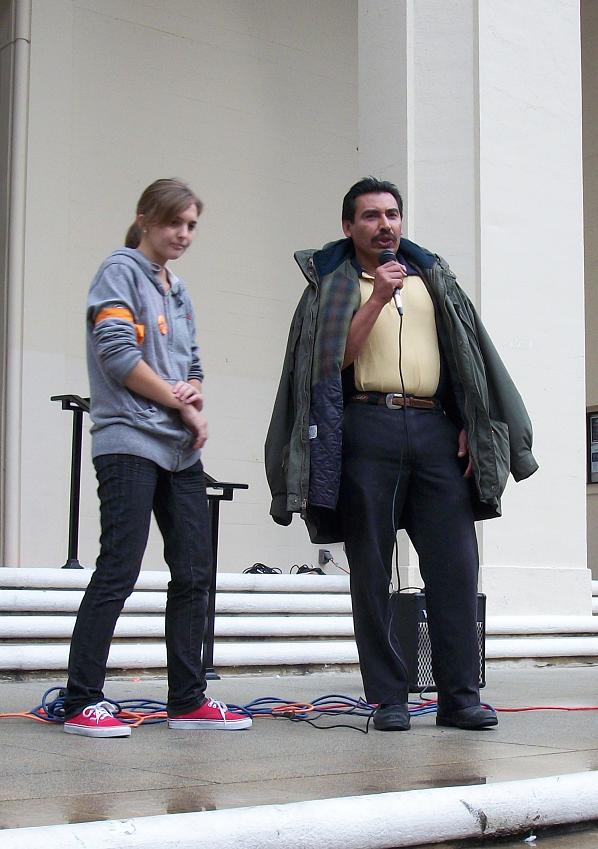
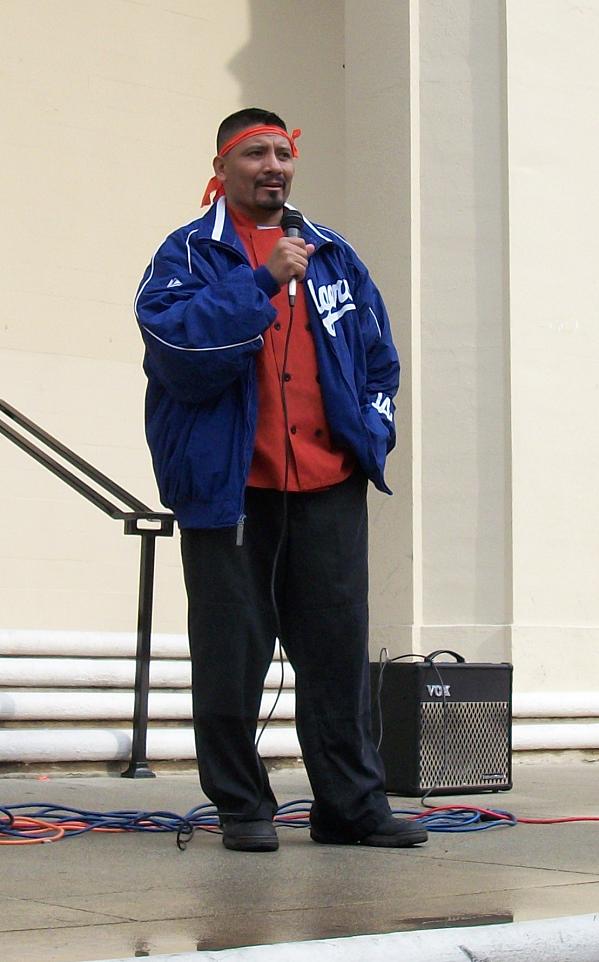
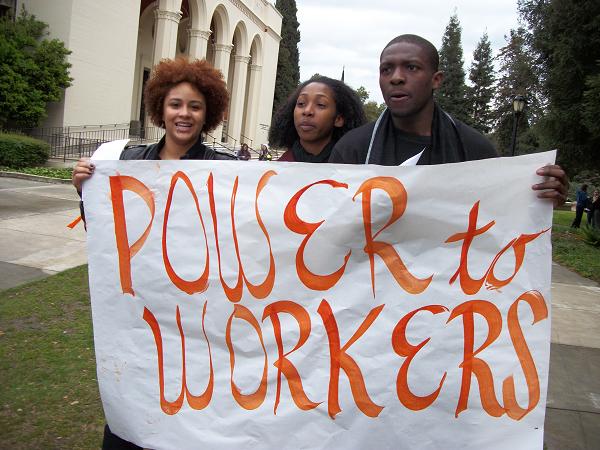
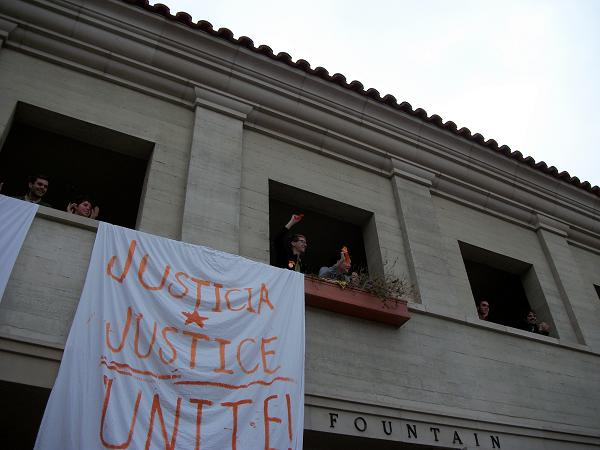
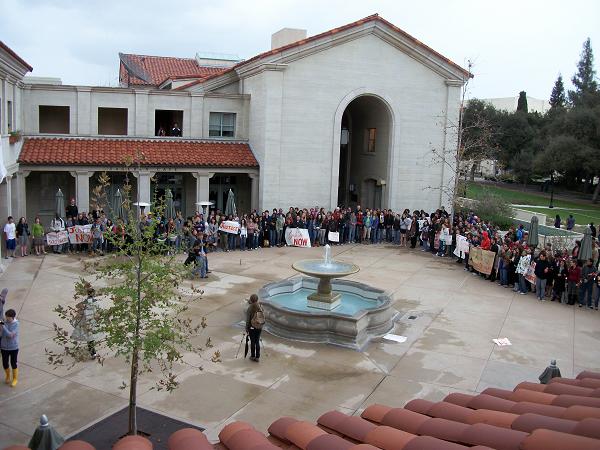
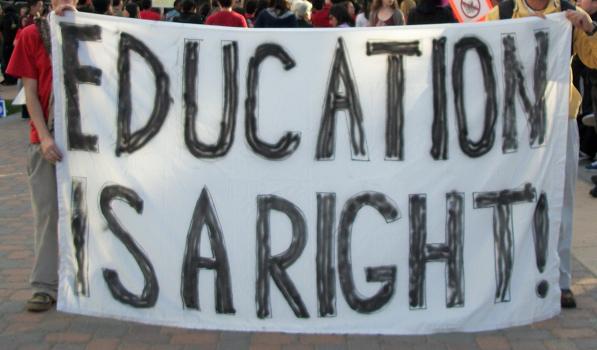
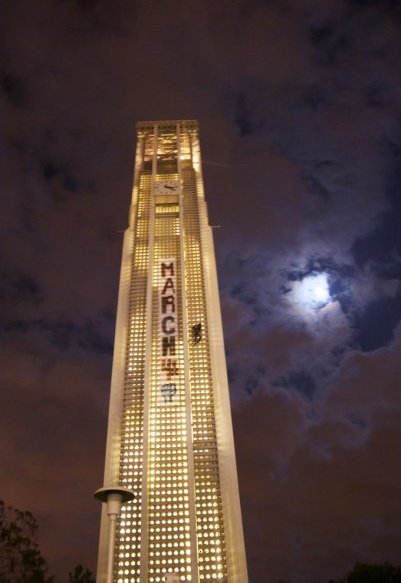 The Inland Empire Invisible Committee kicked things off by
The Inland Empire Invisible Committee kicked things off by 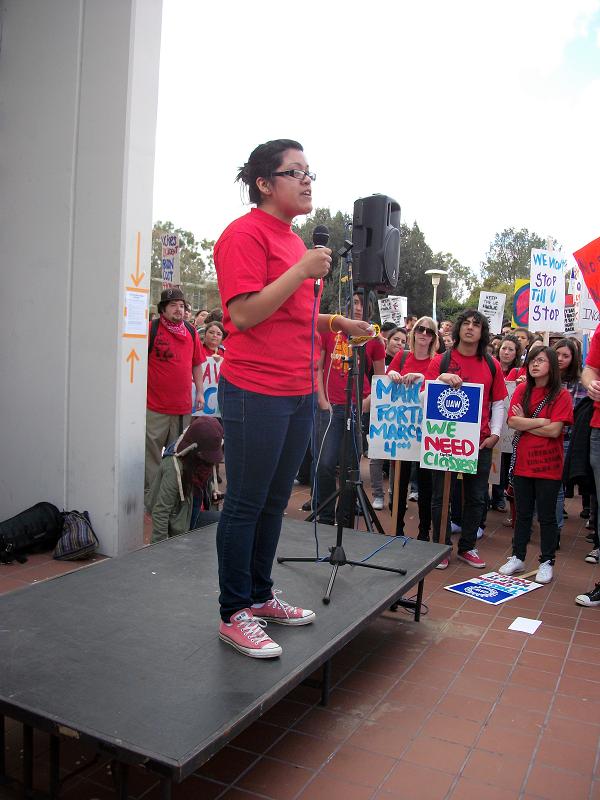 Adriana then orated on behalf of AB540 students. "If you don't know about AB540 students, they have to pay full tuition without any financial help, and that is not fair. Personally, I have to pay $12,000 a year for education out of my own pocket! That shit is not right! It is not right to have to work three jobs to pay for school. It is not right that I have to go through hunger just to pay for school. It is not right that I have to sleep in some of my classes when I should be learning. It is a shame!"
Adriana then orated on behalf of AB540 students. "If you don't know about AB540 students, they have to pay full tuition without any financial help, and that is not fair. Personally, I have to pay $12,000 a year for education out of my own pocket! That shit is not right! It is not right to have to work three jobs to pay for school. It is not right that I have to go through hunger just to pay for school. It is not right that I have to sleep in some of my classes when I should be learning. It is a shame!"  The chancellor defected blame toward Sacramento, urging students to face north and thrice shout "fund education."
The chancellor defected blame toward Sacramento, urging students to face north and thrice shout "fund education." 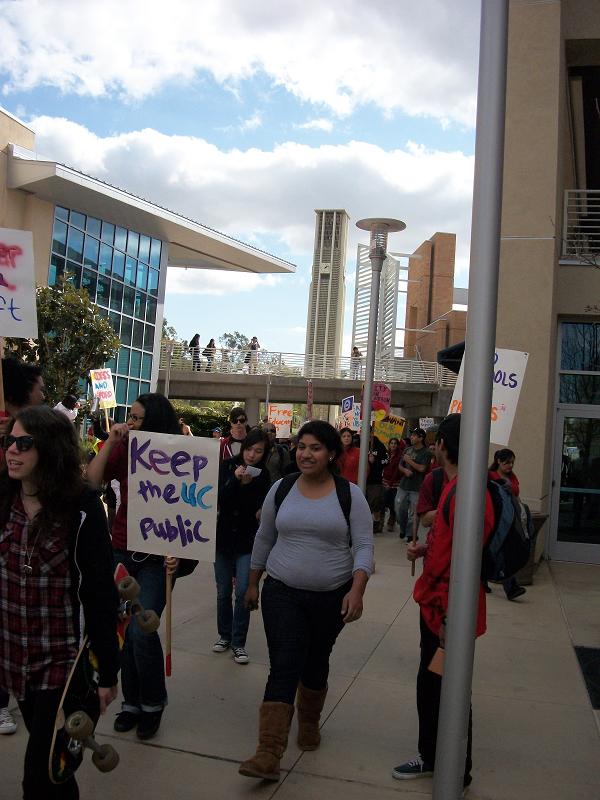 Then the march around the campus began, rallying students to walk out of class and join the resistance.
Then the march around the campus began, rallying students to walk out of class and join the resistance. 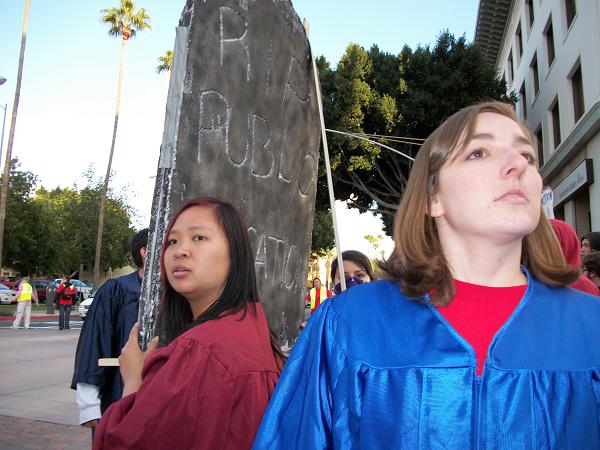 Shortly after the speeches, green-vested peacekeepers, with the support of LiUNA and Warehouse Workers United volunteers, stood alongside the crosswalks connecting the plaza to the other side of University Avenue. A large tombstone was placed in the center of the street, and a student frocked with a graduation robe was carried in to be laid to rest at its foot.
Shortly after the speeches, green-vested peacekeepers, with the support of LiUNA and Warehouse Workers United volunteers, stood alongside the crosswalks connecting the plaza to the other side of University Avenue. A large tombstone was placed in the center of the street, and a student frocked with a graduation robe was carried in to be laid to rest at its foot.